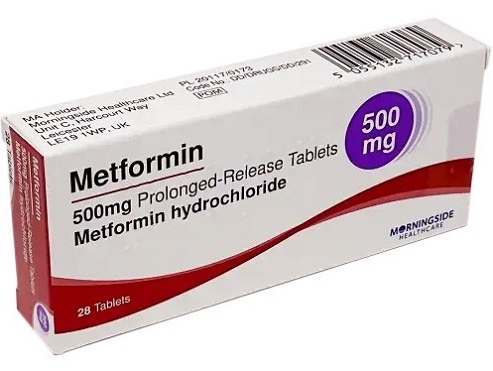Nikhil Prasad Fact checked by:Thailand Medical News Team Jul 02, 2025 7 months, 3 weeks, 21 hours, 19 minutes ago
Medical News:
How a Common Diabetes Drug Could Protect Against COVID-19
In a compelling new study, scientists from Greece have uncovered how a widely used diabetes medication, metformin, could significantly reduce the risk of COVID-19 infection and death in people with type 2 diabetes. This
Medical News report brings attention to a breakthrough that combines advanced molecular analysis with sophisticated mathematical modeling.
 Metformin Might Hold the Key in Reducing COVID-19 Risk in Diabetics
Metformin Might Hold the Key in Reducing COVID-19 Risk in Diabetics
The research, conducted by scientists from the University of Piraeus, the Athens Institute for Education and Research, and the 401 Military General Hospital in Athens, found that patients using metformin were far less likely to suffer severe outcomes from COVID-19 compared to those on insulin or thiazolidinediones (TZDs). The researchers used a cutting-edge technique called Fourier-Transform Infrared (FTIR) spectroscopy to study tissue samples and then created mathematical simulations to understand the real-world implications of antidiabetic drugs during the pandemic.
FTIR Spectroscopy Reveals Molecular Clues
The team analyzed artery tissue samples from diabetic patients and observed key differences based on the type of medication used. In patients who had been treated with TZDs or insulin, there were dramatic changes in protein structure and increased signs of oxidative stress—conditions that favor COVID-19 infection and worsen inflammation.
One of the most significant findings was a new molecular marker appearing at 1775 cm⁻¹ in FTIR spectra. This band is linked to IgG antibodies and protein glycosylation, signs that the body is undergoing stress and immune system changes often triggered by viral infection. These markers were most pronounced in TZD-treated patients and least observed in metformin users, suggesting a protective effect of metformin at the molecular level.
Mathematical Model Validates Clinical Risk
To strengthen their observations, the researchers developed an advanced mathematical model that factored in real-world data from Greek public health databases. Their simulation clearly showed that metformin users had the lowest mortality rates, followed by insulin users, and then TZD users. In fact, among the patients studied, 25 of 60 on TZDs died from COVID-19, while only 21 of 144 on metformin succumbed.
The model used a fractional-order calculus approach to simulate infection risk, accounting for medication effects on the body’s molecular environment. The metformin group had the lowest fractional-order parameter (γ = 0.3), indicating stronger protection compared to insulin (γ = 0.5) and TZDs (γ = 0.9).
How Metformin Works Against the Virus
The study found that metformin may offer dual protection against SARS-CoV-2. First, it directly binds to the virus’s spike protein through its nitrogen (NH) groups, forming hydrogen bonds that may prevent the virus from entering cells. Secondl
y, it indirectly lowers the body’s production of advanced glycation end products (AGEs), compounds that create more viral entry points by altering cell membranes.
This double action not only inhibits the virus from entering host cells but also reduces inflammation, improves ATP (cellular energy) production, and restores calcium balance—key functions disrupted during COVID-19 infection.
Why Thiazolidinediones Could Worsen COVID Risk
On the other hand, TZDs may contribute to higher COVID-19 severity by increasing oxidative stress and promoting lipid peroxidation. They interact with the P450 enzyme system, potentially worsening inflammatory pathways and weakening the body’s ability to fight off viral infections. Their association with weight gain and heart complications further complicates outcomes for diabetic patients during a viral illness like COVID-19.
Conclusions
The study underscores that not all diabetes medications offer the same protection against viral threats like SARS-CoV-2. Metformin stands out due to its ability to bind directly to viral proteins and prevent excessive production of harmful AGEs, offering a unique shield to diabetic patients. In contrast, insulin and especially TZDs may heighten vulnerability due to molecular alterations and inflammation.
These findings highlight the urgent need to consider the pharmacological properties of chronic medications during pandemics. Physicians should take note of metformin’s protective features, and further clinical trials should explore its role in COVID-19 prevention and treatment strategies, especially in vulnerable diabetic populations.
The study findings were published in the peer reviewed International Journal of Molecular Sciences
https://www.mdpi.com/1422-0067/26/13/6332
For the latest COVID-19 News, keep on logging to Thailand
Medical News
Read Also:
https://www.thailandmedical.news/news/how-sars-cov-2-spike-protein-triggers-neurodegenerative-diseases-and-the-potential-of-metformin-as-a-therapeutic-remedy
https://www.thailandmedical.news/news/metformin-s-impact-on-immune-response-genes-and-gut-microbiota-in-covid-19-patients-with-type-2-diabetes
https://www.thailandmedical.news/news/covid-19-news-weill-cornell-study-finds-that-sars-cov-2-infects-and-triggers-senescence-of-dopamine-neurons-metformin-helps
